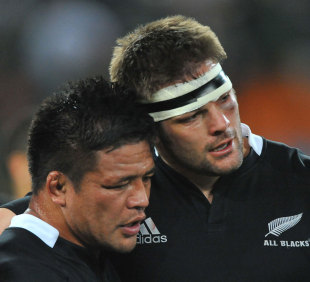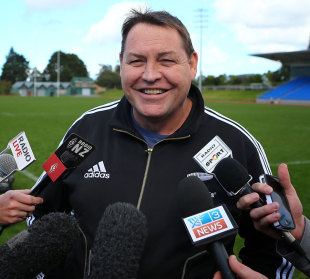|
Rugby Championship
Business as usual for All Blacks
Huw Turner
October 9, 2012

Richie McCaw's status has only grown during the Rugby Championship
© Getty Images
Enlarge
The year 2012 looked like it might be a tricky one for the All Blacks. Anti-climactic struggles to find their feet after the euphoria of an unforgettable World Cup triumph; a new untested coaching team and doubts about the effectiveness of the Steve Hansen/ Ian Foster axis; playing resources in the wake of the inevitable post-World Cup retirements, defections to all corners of the planet and simple burn-out and exhaustion. With one remaining Bledisloe Test and then the end of year northern tour to come, this is beginning to look like a triumphantly unbeaten year. One in which the famously pragmatic All Blacks approach has allowed them to move on from the redemptive experience of 2011 and build the foundations upon which the 2015 campaign will be built. As transitional years go, this has been one of the most resoundingly impressive. Writing about the performances and status of All Blacks skipper Richie McCaw has become perilous if you are worried about the pitfalls of cliché and hyperbole. How do we adequately sum up his contribution without resorting to lazy references to his legend? Images of his battered face at the end of last weekend's test against the Springboks in Johannesburg will do as a starting point. Add to those the brutal forearm smash to his jaw by Springbok prop Greyling in Dunedin, and his largely one-legged World Cup performances, and you begin to get a real understanding of why his indestructible example makes him such a formidable opponent and such a revered leader. The statistics around McCaw's test career are truly staggering: he has contributed to 100 victories in his 112 tests and has only ever experienced defeat against four opponents. When Graham Henry announced his All Blacks retirement at the end of the 2011 World Cup campaign, an entirely understandable and appropriate decision, I thought that McCaw should follow suit. His body was clearly showing the signs of wear and tear and wouldn't it be the logical time to bow out, his reputation secure, his place as the greatest amongst a number of great All Blacks skippers established. Now I am not so sure, although I do find it difficult to imagine he could still lead the All Blacks into their World Cup defence in England in 2015. His recently announced rugby sabbatical is clearly not intended as a short-term solution to his fatigue and need for rehabilitation, he clearly has his focus on the mid-term. And with no deterioration of his on-field performance who is to say that he is incapable of maintaining his own very high standards? Coach Hansen has also proved himself a class act in 2012. This comes as something of a surprise, his much-remarked upon dourness regarded as a likely impediment to his development as a successful All Blacks head coach. He has shown a lightness of touch and tactical aplomb which perhaps answers some of the questions about his contribution to the Henry-Smith-Hansen triumvirate. It was never entirely clear who was contributing what in the years leading up to the 2011 World Cup, and perhaps the chemistry involved in all successful coaching partnerships defies close analysis, personal interaction probably as important as technical accomplishment. Whatever, Hansen has surely answered any doubts that might have existed about his suitability to lead the All Blacks into 2015, and the same can probably be said about Ian Foster.

It's all smiles for Hansen who has six wins from six
© Getty Images
Enlarge
I must admit to having had doubts about the quality of his coaching record at the Chiefs, but the development of All Blacks back play, with all the uncertainties around Dan Carter's fitness and his playing longevity, as well as the disruptions caused by Sonny Bill Williams' stop-start All Black career, seems to be proceeding serenely. The Carter, Ma'a Nonu, Conrad Smith midfield has been re-energised by the successful introduction of half back Aaron Smith. Planning for the succession is proceeding well, with Carter unlikely to appear in 2015, Aaron Cruden is being given time and opportunities to succeed to the No.10 shirt. After a terrific start to his test career, Cruden's form has stalled, but that is only because the expectations of him are so high, and the career of Carter has been so exceptional. With 2015 in mind, I believe there is a lot of work to be done with the forwards. Second row resources have been replenished in the wake of Brad Thorn's retirement, youngsters like Brodie Retallick and Luke Romero making impressive progress in their debut season. Another youngster, back rower Sam Cane, has shown that he is waiting in the wings as a more than adequate deputy for McCaw, but as I indicated earlier his full-time elevation may yet be delayed for a little longer than seemed likely at the start of the season. In the front row, time is running out for Tony Woodcock, Keven Mealamu and Andrew Hore, so we may see the end of season northern tour being used to blood some fresh legs. In the back row, the emergence of Liam Messam as a Test player who can cover all three positions gives the selectors some flexibility and continuity in the short-term absence of McCaw. It is widely anticipated that Kieran Read will step up to the captaincy. I don't see many candidates for that job beyond the Canterbury No.8 and he has long identified himself as All Blacks captaincy material. So, it is business as usual for the All Blacks. That in itself is a triumph. © ESPN Sports Media Ltd.
|
Live Sports
Communication error please reload the page.
-
Football
-
Cricket
-
Rugby
-
- Days
- Hrs
- Mins
- Secs
F1 - Abu Dhabi GP
Abu Dhabi Grand Prix December 11-131. Max Verstappen ()
2. Valtteri Bottas (Mercedes)
3. Lewis Hamilton (Mercedes)
4. Alexander Albon ()
5. Lando Norris ()
6. Carlos Sainz Jr ()
-
ESPNOtherLive >>
Snooker - China Open
Tennis - Miami Open

